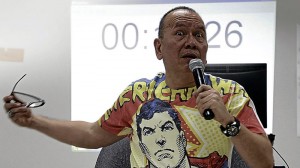Fearless filmmaker on the cult of celebrity in show biz, politics

DIRECTOR Jose Javier Reyes fields questions from reporters in training at the PDI office in Makati City.EDWIN BACASMAS
He thinks the feisty Annabelle Rama, the talent manager running for Congress, is a “potential loudspeaker of the House.” He says Gov. Vilma Santos is taking her job more seriously than her husband, Sen. Ralph Recto.
Few in show biz can discuss issues as fearlessly and eloquently as the award-winning filmmaker Jose Javier Reyes. “When the moon starts to wane in your meadow you enter a totally different field. You don’t enter a lugawan, you enter politics,” he said of actors running for public office.
In a country where popularity always wins the votes, actors have this second career to look forward to when their box-office appeal fades, Reyes elaborated. He called politics the “alternative retirement career.”
Reyes, who showed up in a yellow DC Comics-inspired Superman tee that screams “American,” white knee-length pants and yellow canvas shoes, talked animatedly during an interview with Inquirer reporters.
Leaning slightly forward, never resting against the back of the chair, Reyes gesticulated with his hands when he felt his words needed stronger articulation. He raised his arms in exasperation, dropped them to show resignation, waved them to emphasize a point.
The very vocal director ruminated for half an hour about the fragile fabric of Filipino society, the cult of celebrity, the romantic agony spurned by aberrant Catholicism and the fatalistic message of telenovelas.
When people’s votes are based on an actor’s heroic characters played on the silver screen, he noted, it’s time to rethink the power of the entertainment industry. Many people in media, especially television, he said, assumed that the masses did not think.
False hope
“Telenovelas say suffering is good, marangal ang mahirap, ang mayaman ang salbahe (the poor are honorable, the rich are evil),” he said. “You suffer now because you will be rewarded eventually. This gives us a very false sense of hope. You need not fight back, because the happy ending will come anyway … This is the conditioning that audiences get. In other words, magdusa ka dahil OK magdusa, huwag mo na lang ipaglaban ang iyong karapatan (you should suffer because it’s okay to suffer; never mind standing up for your rights).”
That may not be a lot on its own, Reyes added, but when fatalism is compounded by Catholicism’s romanticizing of pain and suffering, then it produces a society that does not challenge the status quo and relies heavily on the hope that someday things will be better.
“If [Jose] Rizal were still alive he’d realize not much has changed since his time. We all speak English now and have Internet but we’re really still the same,” he said.
Reyes gave the Japanese as an example: “While globalization is inevitable, the Japanese will always bring about a distinct Japanese touch into anything that permeates their society. In their hands, jazz was transformed into Nippon Jazz, and animation became the manga fever.”
No easy way
But when something huge hits the Philippines—K-pop for instance—Reyes pointed out that Filipinos embrace the trend and lose themselves in it. “It is so easy for a foreign culture to come in and eat us up … There is no easy solution to this.”
His prescription: “Education, conscientization and greater democratization.” Education empowers, he explained. “Educated people become critical thinkers instead of accepting everything fed to them.”
It is unfair to say that actors, collectively, do not have the right to enter politics, Reyes admitted. He urged celebrities to instead use their popularity to promote education in the country—“and to promote it as a personal commitment.”
He stressed: “Most celebrities today promote advocacies pushed by their networks. This can be a problem, since networks have partisan interests and will always protect those. Commitment to help or serve need not be made public. You don’t have to be in the government to help the country. You do what you can in your own capacity.”
Reyes might be skeptical of actors’ motives for entering public service, but he was also quick to say that not everyone was a slacker in that second career. Among the few who had successfully transformed, he said, were Gov. Vilma Santos, Quezon City Mayor Herbert Bautista and Rep. Lucy Torres-Gomez.
“It all depends on who aspires to run and what you’d see are his/her reasons for entering politics,” he said. “There are certain people who, if they landed in public office, would leave me no choice but to migrate. When they announce their candidacy, I don’t say anything. I just sit on the sidelines and watch the Titanic sink.”
What did he think of former action star turned politician, Sen. Lito Lapid?
Reyes unblinking reply: “I admire Vilma [Santos].”














